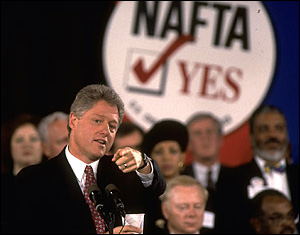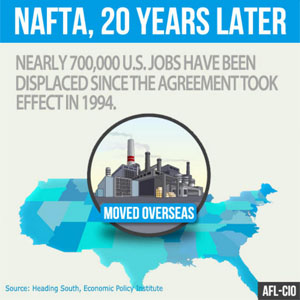NATIONAL
NAFTA: 20-year legacy of middle-class harm
 WASHINGTON, D.C. (Mar. 28, 2014) — Twenty years later and what have we learned from the North American Free Trade Agreement (NAFTA)?
WASHINGTON, D.C. (Mar. 28, 2014) — Twenty years later and what have we learned from the North American Free Trade Agreement (NAFTA)?
Nearly 700,000 U.S. jobs have been lost or displaced, union density in the United States, Mexico and Canada fell and income inequality has increased. The AFL-CIO’s new report, NAFTA at 20, discusses how current U.S. trade policy has failed to raise wages, improve social standards or address inequality — and what needs to change to ensure that future trade agreements actually work for working people.
NAFTA was sold to the public as a way to promote equitable growth, but as the report details, NAFTA-style trade deals benefit corporations at the expense of workers, farmers, consumers and communities.
Wages in all three countries are stagnant. Productivity has increased, but the share going to workers has decreased. Union density has declined and precarious work without stable hours or benefits is on the rise. The overall volume of trade between the three countries has undoubtedly grown, but those gains are concentrated at the top, not distributed across society. Instead, inequality has skyrocketed.
 Flat wages and an eroding middle class did not happen by accident — they are the result of the NAFTA model, a model that deals with broad economic governance issues, including investment, intellectual property, consumer and environmental protections, labor rights — issues not inherently trade-related. NAFTA made it easier and less risky for companies to move operations where the cost of labor was cheapest but contained no effective mechanism to ensure labor rights or environmental protections were enforced.
Flat wages and an eroding middle class did not happen by accident — they are the result of the NAFTA model, a model that deals with broad economic governance issues, including investment, intellectual property, consumer and environmental protections, labor rights — issues not inherently trade-related. NAFTA made it easier and less risky for companies to move operations where the cost of labor was cheapest but contained no effective mechanism to ensure labor rights or environmental protections were enforced.
The model’s deregulatory agenda limits government’s ability to act in the public interest. For example, procurement provisions prevent governments from including requirements that companies contribute to local development or respect fundamental human rights in contracts, limit equitable access to public services and raise the price of medicines through stringent intellectual property protections.
Meanwhile, investors were given unprecedented privileges and protections, which have been replicated in later trade agreements. Along with various deregulatory guarantees, multinational corporations obtained sweeping property rights and a unique—and uniquely dangerous — way of enforcing them: Investor to State Dispute Settlement (ISDS). ISDS allows foreign investors to directly sue national governments over policies they think threaten their bottom line. Instead of domestic courts, claims go before secretive international tribunals that can award unlimited taxpayer money but are unaccountable to the public. Multinationals have used these quasi-courts, which are usually composed of the same trade lawyers that bring these claims on behalf of companies, to challenge numerous regulations in the public interest.
 The report highlights the need for a trade model that promotes shared prosperity.
The report highlights the need for a trade model that promotes shared prosperity.
Unfortunately, current U.S. trade negotiations on two agreements — the Trans-Pacific Partnership and the Transatlantic Trade and Investment Partnership, which involve 39 countries in Asia, the Americas and Europe — seem to only offer more of the same. The lack of transparency around the negotiations means the exact content of the proposed agreements remains unknown, preventing public debate and scrutiny. But leaked documents indicate that the agreements contain the same flawed provisions, and then some. Draft text expands areas like intellectual property rights and opens up new sectors, including financial regulation, which could imperil the government’s ability to react to and prevent economic crises.
Workers live in a globalized economy, and now more than ever global rules to protect people and the planet are necessary. The NAFTA model does not deliver on the things people need — quality employment, enhanced social mobility and shared prosperity. It’s time for a new approach.
This report is from AFL-CIO Now. Has NAFTA affected you? We’ll be running several blog posts on some of the critical failures of the NAFTA model and how it has impacted workers and their families. If you want to share yours, please contact tradestories@aflcio.org.





